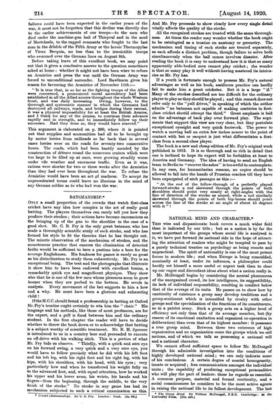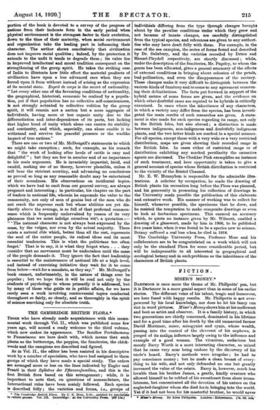NATIONAL MIND AND CHARACTER.* Tors wise and dispassionate book covers
a much wider field than is indicated by our title ; but as a nation is by far the most important of the groups whose social life is analysed in it, we have put forward its national side in the hope of attract- ing the attention of readers who might be tempted to pass by a purely technical treatise on psychology as being remote and unpractical. The spirit of nationality is one of the most potent forces in modern life ; and when Europe is being remoulded, nominally at least, under its influence, a philosopher could hardly set himself a more useful or urgent task than to clear up our vague and discordant ideas about what a nation really is.
Mr. McDougall begins by considering the mental phenomena of the unorganized crowd, its low intelligence, its suggestibility, its lack of individual responsibility, resulting in conduct below that of the average of its units. He passes on to show how by continuity of existence a group may develop traditions and a group-sentiment which is intensified by rivalry with other groups and the specialization of the functions of its constituents, as in a patriot army. Such a group acts on a higher level of efficiency not only than that of its average member, but (by reason of its emotional exaltation and organized co-operation in deliberation) than even that of its highest member: it possesses a true group mind. Between these two extremes of high organization and no organization come the groups which We call nations, and of which we talk as possessing a national will and a national character.
We cannot afford sufficient space to follow Mr. McDougall through his admirable investigation into the conditions of highly developed national mind ; we can only indicate some of his conclusions. A certain degree of mental homogeneity, innate or acquired ; free communication amongst the individual units ; the capability of producing exceptional personalities who will play the part of leaders: these he regards as essential. A common purpose, material and formal continuity, and a social consciousness he considers to be the most active agents in raising the national life to its fullest development. The last
• The Group Mind. By William McDougall. Cambridge : at the University Preps. net.] portion of the book is devoted to a survey of the progress of nations from their inchoate form in the early period when physical environment is the strongest factor in their evolution, down to the time of their maturity, when social environment and organization take the leading part in influencing their character. The author shows conclusively that civilization does not improve racial qualities ; indeed, by the protection it extends to the unfit it tends to degrade them ; its value lies in improved intellectual and moral tradition consequent on the strengthening of the group spirit. He takes the striking case of India to illustrate how little effect the material products of civilization have upon a less advanced race when they are forced upon it from without instead of arising as the expression of its mental state. Esprit de corps is the secret of nationality. " Let every other one of the favouring conditions of nationality, the geographical, historical, economic be realized by a popula- tion, yet if that population has no collective self-consciousness, is not strongly actuated to collective volition by the group spirit, it will remain not a nation but a mere aggregate of individuals, having more or less organic unity due to the differentiation and inter-dependence of its parts, but lacking that higher bond of unity which alone can ensure its stability and continuity, and which, especially, can alone enable it to withstand and survive the peaceful pressure or the warlike impact of true nations."
There are one or two of Mr. McDougall's statements to which we might take exception ; such, for example, as his remark that " the work of looking after herds of cattle is easy and delightful " ; but they are few in number and of no importance to his main argument. He is invariably impartial, lucid, and candid, making use of no theory, however plausible, unless it will bear the strictest scrutiny, and advancing no conclusions as proved so long as any reasonable doubt may be entertained of their soundness. His observations on incidental topics, which we have had to omit from our general survey, are always pregnant and interesting ; in particular, his chapter on the part of leaders in national life, wherein he expounds the value to the community, not only of men of genius but of the men who do not reach the supreme rank but whose abilities are yet dis- tinctly above the average, is so full of that profound common- sense which is frequently undervalued by reason of its very plainness that we must indulge ourselves wit's a quotation :- "'The national character re- not always best expressed by the mass, by the vulgar, nor even by the actual majority. There exists a natural elite which, better than all the rest, represents the soul of the entire people, its radical ideas and its most essential tendencies. This is what the politicians too often forget.' That is to say, it is what they forgot when . . . they consider that no movement must be undertaken until the mass of the people demands it. They ignore the fact that leadership: is essential to the maintenance of national life at a high level, and instead of exercising initiative they wait for it to come, from below—wait for a mandate, as they say." Mr. McDougall's, book cannot, unfortunately, in the nature of things ever be popular ; but we hope that it will be read not only by the students of psychology to whom primarily it is addressed, but by many of those who guide us in public affairs, for we have rarely, seen a work involving controversial topics conducted throughout so fairly, so clearly, and so thoroughly in the spirit of science searching only for absolute truth.



































 Previous page
Previous page